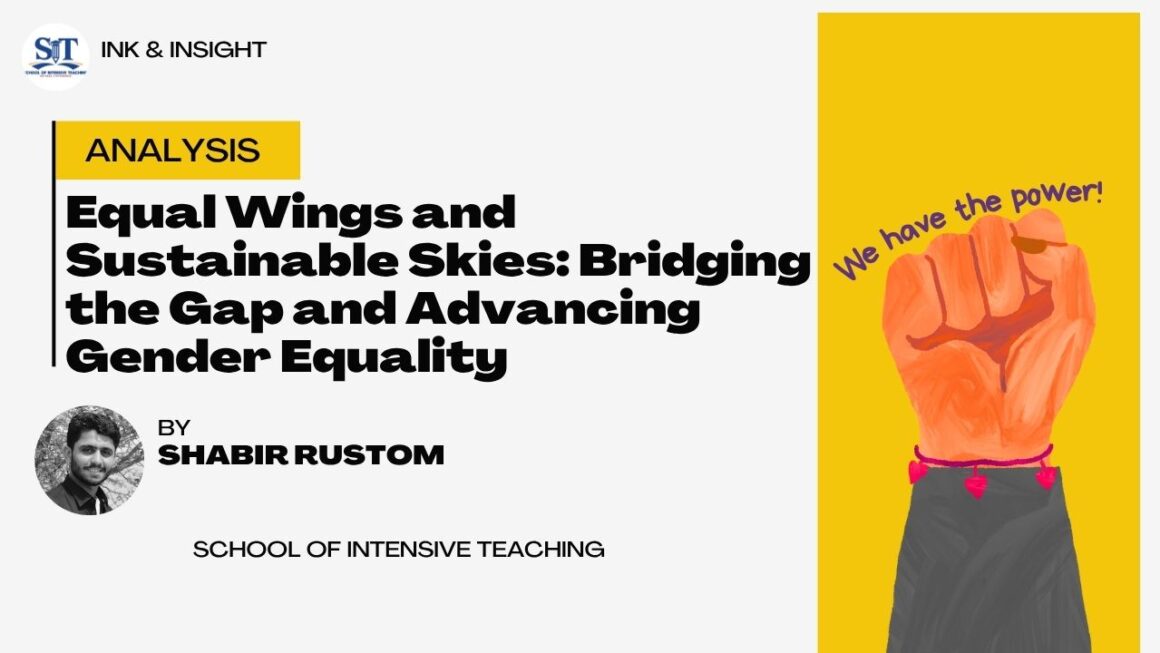By Suhail Ahmed
On July 2021, no one knew that a girl living in Islamabad would be a victim of severe male brutality. She was harassed, tortured, and not allowed to escape. When police arrived at the scene, the beheaded body of the victim and the murderer, soaked in her blood, were found. This is not the only story of Noor Mukhadam but also of several other women who had fallen victim to patriarchal dominancy. Similarly, in 2010, three teenage girls were buried alive in Balochistan for choosing their life partners. The cases of male brutality and dominance have increased despite the promise to bring equality by United Nations. The progress towards it has been slow; no such region exists in the world where gender equality exists completely.
According to the sociological aspect, gender equality refers to the definition of men and women by societies which distinguishes and assigns them different societal roles. This process starts from birth. The birth of a son is often celebrated, whereas the birth of a daughter is filled with pain and shyness. The toys given to boys strengthen their interactions, competitiveness, and boldness, while the toys for girls mostly relate to a bound society and restricting freedom. Though some claim that gender equality exists, the rise in honour killings, acid attacks, limited access to education for girls, and patriarchal dominancy in political and executive positions justify the fact that gender equality is a myth.
The reality of gender inequality lies in this that women have often been on the receiving end. The rising number of crimes against women has turned gender equality into a myth. Pakistan has the highest number of documented and estimated honour killings. About one-fifth of the world’s honour killings are committed in Pakistan. The orthodox belief that the victim has brought dishonour upon the family and community is the reason behind such acts. Among these victims of honour killings is Qandeel Baloch, who was strangled to death in 2016 by her brother. Likewise, Saba Qaiser was another surviving victim who was shot in the face by her father and uncle. The victim was later dumped in the river. Her fault was marrying without her family’s consent.
The patriarchal dominancy has made women prisoner of their thoughts and has made them suffer from dependency syndrome.
Apart from honour killings, acid-throwing is one of the most common types of outbreaks of violence in developed countries. The women who have refused to marry are mostly the victims. According to the Global Gap Index 2013, Bangladesh, India, and Cambodia were the three nations with the most noted incidence of acid attacks. The Acid Attack International (ASTI) reports that 80% of acid attack victims are women in Pakistan.
Similarly, male dominancy has further widened the chasm. This patriarchal dominancy has made women prisoner of their thoughts, and they have no rights to make decisions. Aisha Khan, chief executive of civil society, claims that this dominance has made women suffer from dependency syndrome. In conservative customs, the patriarchal head still uses women as a tool to settle disputes, and she is married without her concern. She has to suffer for the sake of her family. The rise in such forced marriages and child marriages not only robs girls’ childhood and future but also increases domestic violence, abuse, and health issues. Though, Islam and Pakistan’s constitution give rights to inheritance to women, the male dominancy have deprived women of it. According to the international property index ( IPRI) 2008, Pakistan is ranked 93 out of 115 in property rights protection and 86th in gender equality. Only 3% of women get inheritance properties/ land.
A world beyond gender inequality is only possible if women and men play equal roles in shaping the society.
Besides physical violence, women are also the victim of psychological violence. A clear example can be seen in Afghanistan after the Taliban took over. On March 27, 2022, the Taliban announced that women could not board domestic and international flights without a male chaperone. Despite promises, the Taliban did not let girls go to school. Likewise, there is a huge gender literacy gap in Pakistan. Forty per cent of females are illiterate.
Beyond conservative societies, this gender inequality homogeneously exists among well-off and educated people. Politics and executive positions are male-dominated. After the rule of almost 40 years by men, the first Prime Minister, Benazir Bhutto, was elected. Since then, no other woman has been head of government. In the same way, the National and Provincial Assemblies and other executive positions are male-dominated. Similarly, women’s body is often used as a commodity to sell and advertise things, and sex trafficking is another factor of women’s commodification.
“A gender-equal society would be one where the word ‘gender’ does not exist, where everyone can be themselves.”
Gloria Steinem
More than the two genders, the third gender has been a social outcast. They are socially, economically, and educationally challenged. There is no room for them in any field, making their life a cycle of humiliation that starts from birth and ends with death. The recent rise in their murder in Peshawar is of concern, but there is no one to speak out for them. In this gap of gender inequality, not only women but the Third-gender should be equally treated, and they deserve space and respect too. As Gloria Steinem, a prominent American feminist journalist and social-political activist, says that “A gender-equal society would be one where the word ‘gender’ does not exist, where everyone can be themselves.”
What factors influence and cause gender inequality?
First and above all is the poor implementation of laws. The laws for acid attacks and honour killings are often neglected and are dominated by orthodox customs. The same was observed during the honour killing of teenage girls in Balochistan. The politicians from the province defended the killing in parliament, claiming the practice was a part of tribal customs.
Second, orthodox customs and conservative thinking have encouraged people to follow the traditional way. The patriarchal dominance considers women only responsible for bearing children and obeying their husbands unconditionally. Women are considered a symbol of honour and are not allowed to marry according to their choice, get further access to education, and be out for employment purposes.
Third, the lack of awareness and limited access to education have further nourished this unbridgeable chasm. In Pakistan, 40 per cent of women are illiterate, so they blindly follow the orthodox customs without being aware of their rights.
How can we eliminate the factors contributing to Gender Inequality?
To eliminate these nourishing factors, the laws for women’s protection have to be more strict. Bills like women’s protection passed in 2006, and laws for acid attacks, life imprisonment, and illegal to sell acid and other corrosive substances must be implemented strictly. Similarly, under Article 25, the rights of individuals irrespective of sex, race, and class, and under Articles 26 and 27, equal access and equality in employment in public and private sectors should be guaranteed.
“The world should have the courage to celebrate its sheroes as much as heroes.”
Angelo Maya
Equally important is education to reduce this disparity. More than half of the women’s population must be aware of their rights. The government should install more institutions for women to make them aware.
Media has never lagged in bringing awareness. More programs should be aired and documented as a pivotal role was played by Sharmeen Obaid Chinoy through her documentaries based on acid attacks and honour killings. Furthermore, religious scholars should condemn these acts and put forward the sayings of the prophet Mohammad (PBUH) and the Quran regarding women’s rights.
To summarize, a world beyond gender inequality is only possible if there is no discrimination and women and men play equal roles in shaping society. Angelo Maya stated that the world should have the courage to celebrate its sheroes as much as heroes.
About the Author:

Suhail Ahmed
Contributor at SIT Ink & InsightSuhail Ahmed hails from Panjgur, Balochistan. He has done his graduation from the University of Balochistan in Zoology. His interests are in wildlife and marine science. He tweets @SuhailAhmad













